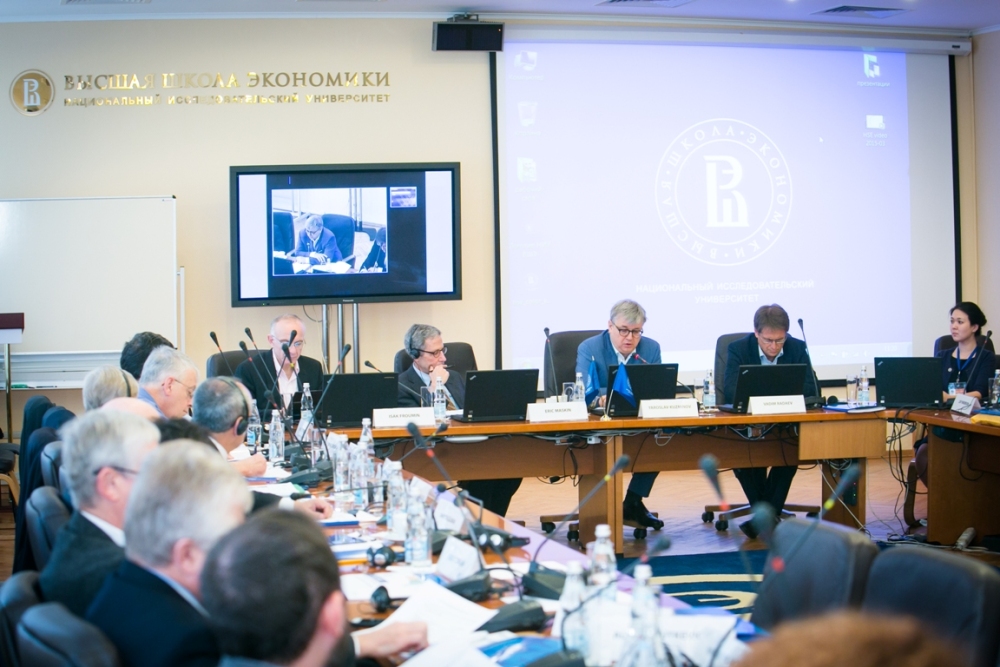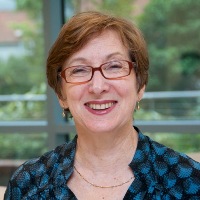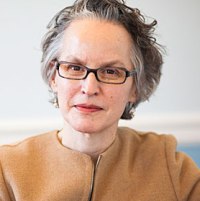International Experts Meet to Advise on HSE Development
 Meeting of International Advisory Committee
Meeting of International Advisory Committee
The meeting of International Advisory Committee starts December 6. Three newly appointed members of IAC have shared with HSE News Service their views on the role of external consultants in the development of universities, described their reasons for joining the committee and spoke about HSE’s academic reputation and the challenges the university faces.

Ellen Hazelkorn, Policy Advisor to the Higher Education Authority (Ireland) Emeritus Professor and Director, Higher Education Policy Research Unit (HEPRU), Dublin Institute of Technology
I have collaborated with HSE researchers, including Maria Yudkevich, Larisa Taradina and Isak Froumin. Some of this work has been related to the topic of university rankings, and participating in various conferences, including the 5th International Conference “Managing Differentiation in Rapidly Changing Higher Education Systems: Challenges and Opportunities”, and more recently the “International Forum on the Implementation of the Excellence Initiatives.” These have been important collaborations, enabling me to gain a wider understanding of higher education developments in Russia and to work on issues of shared interest.
HSE is developing fast, and gaining an international reputation. There are challenges for all universities in today’s increasingly competitive global higher education market. Achieving quality and excellence in teaching and in research are the predominant competitive advantages, but this is easier said than down. Developing the appropriate policies and strategies, and determining the priorities, require difficult choices. These choices need to be appropriate to the university, and its national context, while cognizant of international factors.
I have 20 years’ experience as a vice-president of a university, plus more than 15 years’ international experience working with universities and governments on matters of higher education. I hope to draw on these experiences across many countries and higher education institutions, and bring this experience to the benefit of HSE.
Members of the IAC can play an important role by providing different perspectives which bring an international dimension to strategic thinking and policy-choice for a university. This includes providing information about international trends affecting and impacting on higher education, developments in other countries and lessons learned – and especially with respect to what different universities are doing to improve and enhance their performance, quality and productivity.

Professor Tan Chorh Chuan, President of the National University of Singapore and Deputy Chairman, Agency for Science, Technology & Research, Singapore
External advisory committees can play a very important role in helping universities to conceptualise and drive innovative change. They do so by serving as a sounding board for institutional strategies, providing advice on how these could be enhanced, as well as highlighting the most critical factors which impact on implementation and successful outcomes. External advisory committees typically bring a diversity of views from across a variety of different settings and experiences, and can also be very useful connectors to partners and collaborators around the world. In some cases, external advisory committees also provide inputs to the university management on the quality of the faculty and their work. At NUS, each academic department has an External Visiting Committee visit every 5 years, and we have found this practice to be very helpful.
I am delighted that a number of NUS faculty are already working together with HSE colleagues, providing a good basis for further collaborations. HSE is well known as one of the foremost universities in Russia and is widely regarded as a young yet outstanding, dynamic and forward-looking institution. I look forward to learning a great deal more during the meeting in HSE in December, but in reviewing the materials beforehand, I am very impressed by the rapid progress that HSE has made in a short space of time, and by the strategic and innovative approaches it has pioneered.
It is likely that the key challenges that HSE currently faces will be similar to those in other universities on a very sharp upward trajectory. The most important is the ability to attract and retain a sufficient critical mass of top faculty as well as bright young faculty and students. Closely linked to this is the ability to provide the energizing environment and infrastructure that enable them to do ground-breaking work, while helping to build longer term capabilities. Another challenge encountered by many leading institutions is how to adapt and innovate their educational framework and programmes so as to nurture future-ready graduates, who are well equipped to seize opportunities in a fast changing world.
I will enjoy learning a great deal more about HSE, and about higher education in this part of the world more generally. I expect that the discussions will be very rich, sparking off many interesting new insights and ideas for all those participating. As NUS is a global university centred in Asia, I hope I can contribute by bringing perspectives from Asia where higher education is developing very rapidly, while at the same time, sharing the insights which NUS has gained from its many deep partnerships with leading universities around the world.

Leah Rosovsky, Vice President for Strategy and Programmes at Harvard University
This is my first experience with HSE although I have met a number of HSE senior leaders over the past few years. I was especially interested in serving on the HSE International Advisory Committee since part of my own portfolio at Harvard includes international work. I look forward to having the opportunity to learn from HSE’s experience as well as the chance to share the perspectives I have gained over decades of service in higher education in the exciting arena of international scholarship.
Many universities find it helpful to gather perspectives from people outside the institution as well as from those inside. Advisors can bring knowledge gained through experience with different cultures and approaches to specific challenges. In addition, advisors can offer examples of approaches that might have a track record of success. This can stimulate new ideas and discussion within the university.
HSE has made steady progress in international rankings since its founding especially in subjects of particular focus. Maintaining that momentum will be very important over the next decade.
Maria M. Yudkevich
See also:
HSE Launches English-Language Strategic Development Website
The new website makes information on the university’s strategic development initiatives and opportunities available to international colleagues and partners. The Strategic Development Programme Office has launched anEnglish-language website to promote the implementation of HSE University’s integrated development programme. The website is an ‘entry point’ for international partners and students, informing them about the university’s strategic priorities, goals, and plans.
HSE University Leads in Four Subject Rankings of ‘Three University Missions’ Rankings
In 2023, HSE University took first place in the ‘Three University Missions’ subject rankings in economics, sociology, management and psychology. The university also entered the top three in terms of the number of subjects covered by the rankings.
'We’re Moving On to the Next Stage of Digital Transformation'
Dmitry Bondar has served as Senior Director for Digital Transformation at HSE University since January 2021. Since then, the university has introduced and developed numerous new, state-of-the-art information systems. Dmitry Bondar is responsible for ensuring high rates of digital transformation and the good performance of HSE's IT Office. In his interview, he speaks about the integration of new information systems, project management at the IT Office, import substitution in IT, engaging with students, and plans for the current year.
‘The Project Competition Will Kickstart New Research Collaborations’
HSE University has announced the launch of a project competition in basic science research for intercampus departments of the university. The competition is aimed at supporting research as part of the HSE University Development Programme for the Period until 2030.
‘Our Development Programme Is a Meaningful Vision of the Future’
The HSE University bulletin (Okna Rosta) spoke to Rector Anisimov about the details and significance of the newly approved Development Programme, changes to academic life due to the pandemic, the role of digitalisation, and the university’s ‘soft expansion’
Russian Government Approves Programme of HSE Development until 2030
The Programme of HSE Development until 2030 has been approved by Prime Minister Mikhail Mishustin’s order. The document outlines the goals, tasks and responsibilities of the government and HSE University for its strategic development. According to the programme, the university’s strategic goal is its continuing development as a leading research, educational, analytical, consulting, and project university, which can compete head-to-head with the world’s best universities.
IAC Welcomes New Members and Discusses HSE University Development
On December 1, key areas of HSE University’s recently adopted strategy were presented at the extended meeting of the International Advisory Committee. Outgoing and new members of IAC learnt more about the University’s initiatives in human capital and AI research, as well as about its plans to build a Master’s Engineering School.
‘The Expertise of Members of IAC Will Be Instrumental in the Continuing Development of the University’
On October 5, HSE University’s International Advisory Committee held an online session. Yaroslav Kuzminov, HSE University Academic Supervisor, introduced the new leadership structure of the University and Rector Nikita Anisimov spoke about his vision for HSE University’s development. Meeting participants discussed various aspects of the University strategy.
Higher Education and State-building: Methaphors of Universities Revisited
How has higher education influenced the evolution of nations since the Second World War—and vice versa? Stanford professor Mitchell Stevens and Institute of Education researcher Ekaterina Shibanova have tried to answer this question in a special issue of the European Journal of Higher Education. They invited renowned historians, political experts, sociologists and economists to develop ‘a consensus on the role of higher education in political and social history after 1945.’ The special issue was created with input from researchers from Canada, Luxembourg, Russia, Germany, France, the UK, and Sweden.
International Advisory Committee Meeting Focuses on HSE University’s Third Mission
On May 31, International Advisory Committee met online to discuss HSE University’s third mission, its implementation and place in the university strategy. The meeting focused on HSE University’s volunteering and social initiatives, cooperation with non-profits, community engagement, students’ field research trips around Russia, and HSE Business Incubator.


